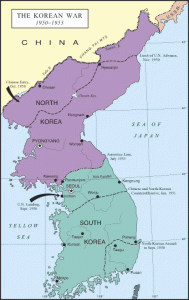 Last week the leaders of North and South Korea held an historic meeting which might open the door for a full and lasting peace on the peninsula and maybe even foreshadow the eventual re-unification of the country.
Last week the leaders of North and South Korea held an historic meeting which might open the door for a full and lasting peace on the peninsula and maybe even foreshadow the eventual re-unification of the country.
Stratfor’s Chief Analyst, Rodger Baker, has been arguing for the past few years that the goal of North Korea’s nuclear program is to create a capability which can then be used to negotiate the reunification of the two countries.
The essential idea would be to create a prosperous, technologically sophisticated country with a strong enough military capacity to stand up to both China and the United States. For Kim Jong Un, the other part of the story is to achieve unification without him, his family, and the North Korean elite ending up in prison, exile or worse.
What I think gives weight to Baker’s arguments is the actual text of the agreement reached in the summit meeting which has the title of the “Panmunjom Declaration for Peace, Prosperity and Unification of the Korean Peninsula“.
The agreement commits the two sides to three ideas as follows:
1. South and North Korea will reconnect the blood relations of the people and bring forward the future of co-prosperity and unification led by Koreans by facilitating comprehensive and groundbreaking advancement in inter-Korean relations.
2. South and North Korea will make joint efforts to alleviate the acute military tension and practically eliminate the danger of war on the Korean Peninsula.
3. South and North Korea will actively cooperate to establish a permanent and solid peace regime on the Korean Peninsula.
Below these lofty ideals are a series of 13 sub-points which are also significant. The first stresses the “principle of determining the destiny of the Korean nation on their own accord” essentially signalling to the Unites States and China that peace and re-unification will happen with or without them!
The last point promises a “a nuclear-free Korean Peninsula” and the point that Rodger Baker makes is that once a nuclear capability is well established, recreating it can be relatively straight forward. My guess is that a unified Korea would secretly keep a limited nuclear capability after the agreement much like Israel has done since the 1960s.
The Korean war resulted when both U.S. and Soviet troops moved to occupy the country after world war II and agreed temporarily to divide it into two spheres of influence at the 38th parallel. The agreement was made by the commanders on the ground but became permanent after war broke out between the North, backed by Soviet Russia and the South.
The United States went to war in 1951 to defend the South together with a coalition of Western forces under a mandate from the United Nations.
The Korean war is significant for two reasons. In the first place the United States decided to back the South due to a heightened perception of the global communist threat after the testing of an atomic bomb by Soviet Russia and the Communist victory in China.
The idea that countries were like dominos and would fall one after the other evolved into a firm tenant of the cold war and was also the rationale for American involvement in Viet Nam ten years later.
 The second factor was that after General Douglas Mcarthur’s successful amphibious landing at Inchon, the war was almost won by the allied forces until they were turned back by the Chinese army. Under orders from Chairman Mao, 30,000 Chinese troops came across the Yalu river taking heavy casualties but saving the North and eventually signing a new armistice on the 38th parallel in July 1953 where things had begun.
The second factor was that after General Douglas Mcarthur’s successful amphibious landing at Inchon, the war was almost won by the allied forces until they were turned back by the Chinese army. Under orders from Chairman Mao, 30,000 Chinese troops came across the Yalu river taking heavy casualties but saving the North and eventually signing a new armistice on the 38th parallel in July 1953 where things had begun.
That is where Kim Jong Un and Moon Jae-in, the President of South Korea, met last week and that is where Donald Trump appears to want to have his own summit with Kim next month.
Trump is taking credit for bringing about the peace talks after the Fire and Fury speech he made and people in South Korea are seriously talking about nominating him for the Nobel Peace Prize.
In my view Trump’s outbursts and increasing tension with China have convinced the leadership of both North and South Korea that their best bet for a prosperous and peaceful future is to get out from in between China and the United States.
Stratfor insists that North Korea has already demonstrated their ability to deliver a nuclear warhead and therefore can afford to stop testing.
The next step is to sign a formal peace treaty and after that maybe reunification. That would be a tremendous boon to the people of North Korea who have lived in dire circumstances for much too long but also to the South.
What it will mean to the geo-political stability of the region and the relationship between the U.S., China, and Japan, will be seen only in the years to come.


Todos torcemos pela paz na Coréia!